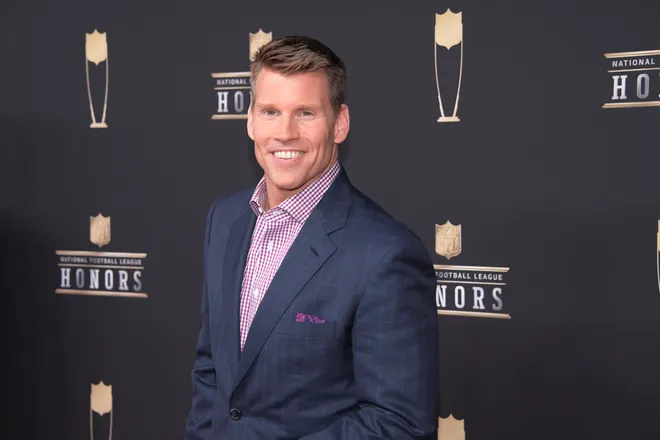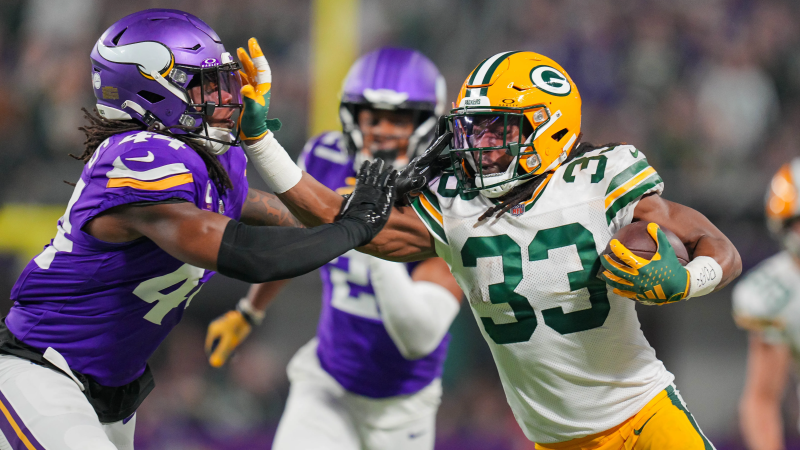The 'witching hour' has arrived: How NFL RedZone sparked a sensation among fans
According to Encyclopedia Britannica, the "witching hour" is a folklore term for the "time at night when the powers of witches and other supernatural beings are believed to be strongest." Colloquially, it refers to "a time of unpredictable or volatile activity."
For NFL fans, it’s the best hour of the week.
The term has become popularized by the NFL RedZone channel that plays up the drama as the games that kicked off at 1 p.m. ET – the busiest window of the Thursday to Monday schedule that the league plays in – conclude.
As NFL RedZone host Scott Hanson says every week, the witching hour is when wins become losses and losses become wins. But it’s more than the flipping of outcomes.
"It became this total phenomenon … it’s taken on a life of its own," Hanson told USA TODAY Sports.
NFL STATS CENTRAL: The latest NFL scores, schedules, odds, stats and more.
"You can’t think of NFL RedZone without the witching hour."

Over the past decade, "witching hour" has gone from a niche phrase for diehards to something that is firmly entrenched in the football zeitgeist, with applications outside of the football world, too.
For example, during MSNBC’s coverage of the 2022 midterm elections, political analyst and former U.S. Sen. Claire McCaskill referred to the time following the closure of the polls as "the witching hour."
"If you watch NFL RedZone," she said, "this is the witching hour … because things are going to be decided soon."
Who came up with the term 'witching hour'?
Hanson’s famous tagline – "when wins become losses and losses become wins" – existed long before he uttered the words "witching hour" on air. He believes he first said it on TV by 2014 at the latest, but most likely a year or two before, he said.
From the time RedZone went live in 2009, Hanson – along with everyone watching at home – knew the last hour of the early slate was the most exciting part of the program.
"I was referring to it back then as, 'Here it comes, eight games going on, half of them in the fourth quarter, half of them coming to the end of the third quarter,' it’s the best hour of sports television," Hanson said.
As time passed, Hanson said he felt the need for something catchier. Social media users interacted with him on Twitter to let him know that they called it "the witching hour." Hanson thought it was an apropos description for the unexpected.
"I was like, ‘That’s kinda catchy. It’s tight. It’s concise. It has the word hour in it.'" Hanson said. "Maybe I’ll call it that."
Hanson was not the first sportscaster to disseminate the term publicly. Who exactly was remains a mystery, but there are clues.
"It was Brent Musburger who came up with it," former New York radio host Mike Francesa said on his show in 2010.
Francesa was a researcher for CBS' "The NFL Today" in the 1980s, a show hosted by Musburger that included Jimmy "The Greek" Snyder, a points spread analyst who tracked scores at the end of the third quarter by writing them down via CBS' multiple feeds and then compared them to the final scores.
"We used to say, 'Hey, witching hour, here we go,'" Francesa said. "Then all hell was going to break loose."
Through a spokesperson, however, Musburger said he does not recall the origin story of "the witching hour." Snyder died in 1996. And multiple attempts to reach Francesa for clarity were unsuccessful.
Hanson said he didn’t know of that history until recently. But the term evidently lasted from the airwaves of the '80s to the social media days of the 2010s to the streaming options of the 2020s.
Something everybody can agree on, though?
"If you watch how dramatically those scores twist and turn and change … it’s the best time," Francesa said 13 years ago.
Popularity throughout the world
By this point, NFL Media has fully leaned into the "witching hour." RedZone coordinating producer Alan Flowers surprised Hanson one day with a graphic – the orange-blur clock and the Undertaker-esque gong – to signal the time frame. To the best of the RedZone crew’s knowledge, that was Oct. 4, 2020.
"They wanted to catch me off-guard with it, and it made me really smile," Hanson said.
There is no specific time they call the "witching hour," Hanson said. The football decides that.
McEnroe Francis, the early-window producer, is the one in Hanson’s ear when it’s time. As soon as they have resolutions for any outstanding updates, Francis will remind Hanson that they must call the witching hour as some games have already begun the fourth quarter. Once they’re on the same page, Francis calls it out in the control room, the graphics and sound-effects people coordinate, and then it is time.
"People have a Pavlovian response to me calling the witching hour," Hanson said.
"If for some silly reason we forgot to do it, there would be people with torches and pitchforks outside of NFL Media headquarters," he added.
People have started dressing up as the witching hour for Halloween. A couples costume could be some variation of one person being a witch, and another being Hanson or a clock.
"That’s a 'You know you’ve arrived when…'" Hanson said.
Hanson is on the celebrity shoutout website Cameo and often receives requests to include the witching hour tagline in his messages. Some examples:
- At a bachelor party: "When fiancés become spouses, and bachelors become grooms."
- One couple about to have a child: "When pregnancy becomes labor, and labor becomes parenthood."
For most NFL fans, though, it’s just the most exciting part of Sundays in the fall.
"It’s wild how it has become this visceral reaction from people," Hanson said, "in a positive way."

Disclaimer: The copyright of this article belongs to the original author. Reposting this article is solely for the purpose of information dissemination and does not constitute any investment advice. If there is any infringement, please contact us immediately. We will make corrections or deletions as necessary. Thank you.







